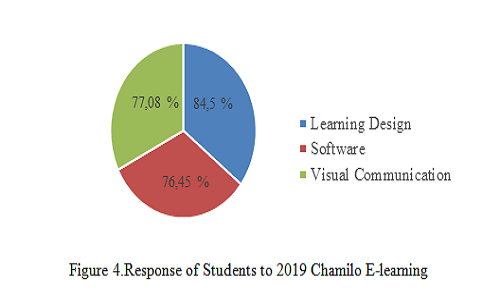
Development of E-learning-based Social Studies Learning Media for Class VII Semester II Junior High Schools
Abstract
This study aims to determine the validity, practicality, and effectiveness of the development of E-Learning-based IPS learning media for Class VII Semester II SMP. This research was a Research and Development. This research was conducte at SMPN 1 Mandau, Bengkalis Regency. The type of data collected in this study was qualitative data obtained from interviews, observations and expert validity. The assessment of students was carried out through a questionnaire. The object of research in this study was E-Learning-based IPS Learning Media for Class VII Semester II Junior High School using Chamilo 2019 software. The data analysis used qualitative descriptive analysis and quantitative descriptive statistical analysis. The qualitative descriptive analysis technique was used to process data from the test results from media experts and material experts, while quantitative descriptive statistical analysis techniques were used for media assessment by 30 students with the help of SPSS. The results of the study state that e-learning-based social studies learning media are declared valid by media experts and material experts, with a practical level of media use that is practical or easy to use and the effectiveness of appropriate media in learning activities, which can save time and facilitate the preparation of teaching materials.
Keywords
Full Text:
PDFReferences
Ashyar, R. (2012). Kreatif Mengembangkan Media Pembelajaran. Jakarta: Gaung Persada.
Bens, P., & Teddy, S. (2014). A Systematic Aprroach To Improving E-Learning Implementation In High Schools. The Turkish Online Journal Of Educational Technology, 13(3), 19-25.
Hamzah, B., & Abdul, R. (2016). Pengembangan Media Pembelajaran IPS Berbasis Website untuk Siswa Kelas VII Madrasah Tsanawiya Negeri. Jurnal Teknologi Pendidikan, 18(3), 169-185.
Hertanto, W. (2016). Penggunaan E-Learning Sebagai Media Pembelajaran. Jurnal Pendidikan Ekonomi, 10(1), 1-15.
Hong, M. L., & Wan, J. C. (2014). The Study of Achievement and Motivation by E-Learning–A Case Study. International Journal of Information and Education Technology, 4(5), 421-425.
Maulida, M., Gimin, G., & Kartikowati, S. (2019). Powerpoint and Wondershare Quiz Creator Interactive Multimedia Development to Improve Student Learning Motivation. Journal of Educational Sciences, 3(3), 390-400.
Mutia, L. (2020). Development of Blog-Based Audio Visual Learning Media to Improve Student Learning Interests in Money and Banking Topic. Journal of Educational Sciences, 4(2), 436-448.
Mahendra, I. J. (2010). Pengembangan Media Pembelajaran Pada Mata Pelajaran Teknologi Informasi dan Komunikasi. Jurnal Pendidikan Teknologi Informatika, 1(1), 1-23.
Muhammad, G. A., & Shadiullah, K. (2010). The Predictors of Success for E-Learning in Higher Education Institutions (Heis) in N-W.F.P Pakistan. Journal of Information Systems And Technology Management, 7(3), 545-578.
Mukson, A. (2011). Pengembangan Media Pembelajaran Berbasis Teknologi Informasi. Jurnal Pendidikan Akuntansi Indonesia, 9(1), 1-10.
Ramadhan, dkk. (2016). Pengembangan Perangkat E-Learning Menggunakan Chamilo untuk Mata Kuliah Fisika Dasar II. Prosiding SNIPS, 491-494.
Rezky, A. (2018). Pengembangan E-learning Menggunakan Chamilo Untuk Membantu Proses Pembelajaran Fisika SMA Kelas X Semester II. Jurnal Grafity, 4(2), 15-25.
Signe, S. N., & Rikke, O. (2015). The Effectivness of E-Learning: an Explorative and Integrative Review of the Definitions, Methodologies and Factors that Promote E-Learning Effectiveness. Electronic Journal of E-Learning, 13(4), 278-290.
Silahuddin. (2015). Penerapan E-Learning Dalam Inovasi Pendidikan. Jurnal Ilmiah Circuit, 1(49), 48-59.
Suharyanto, & Adele, B. L. M. (2016). Penerapan E-Learning Sebagai Alat Bantu Mengajar Dalam Dunia Pendidikan. Jurnal Ilmiah Widya, 3(4), 17-21.
Soemantri, M. (2001). Menggagas Pembaharuan Pendidikan IPS. Bandung: Remaja Rosda.
Sugiyono. (2018). Metode Penelitian Kuantitatif, Kualitatif, dan R&D. Bandung: CV Alfabeta.
Suryani, N., Achmad, S., & Aditin, P. (2018). Media Pembelajaran Inovatif dan Pengembangannya. Bandung: Remaja Rosdakarya.
Wahyuningsih, D., & Rakhmat, M. (2017). E-learning Teori dan Aplikasi.
Bandung: Informatika.
Wayan, I. K. (2018). Pengaruh E-Learning Sebagai Salah Satu Media Pembelajaran Berbasis Teknologi Informasi Terhadap Motivasi Belajar Mahasiswa. Jurnal Sistem dan Informatika 13(1), 1-5.
DOI: http://dx.doi.org/10.31258/jes.5.1.p.53-65
Refbacks
- There are currently no refbacks.
Copyright (c) 2021 Ali Rosmandi, Mahdum Mahdum, Henny Indrawati

This work is licensed under a Creative Commons Attribution 4.0 International License.
Publisher: FKIP Universitas Riau












